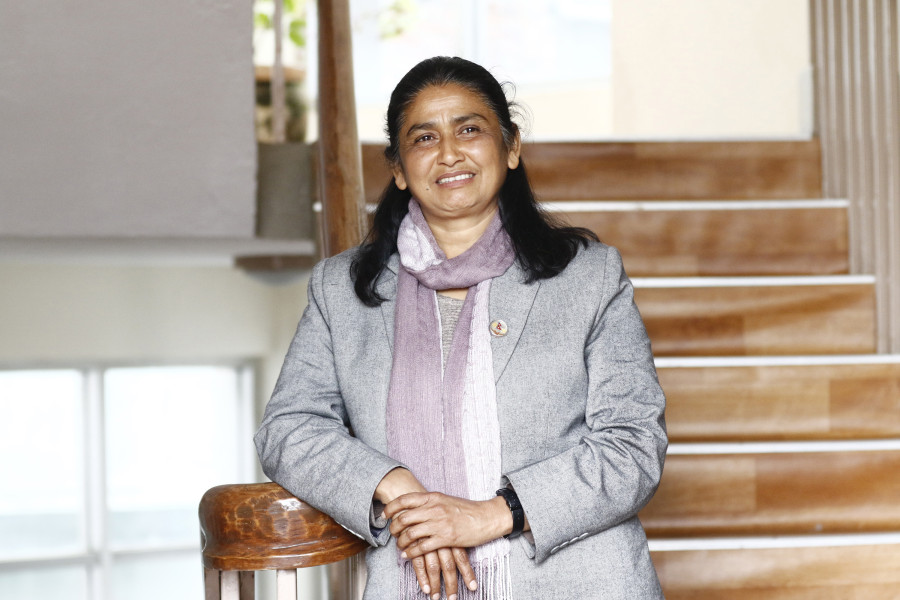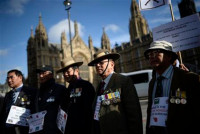National
Women are being denied equal rights in the name of national security and sovereignty: Binda Pandey
Lawmaker Binda Pandey, a member of the ruling Nepal Communist Party (NCP), talks with the Post’s Tsering D Gurung about the importance of amending the current Citizenship Act and the challenges that need to be overcome in ensuring equal laws are passed.
Tsering D Gurung
Lawmaker Binda Pandey, a member of the ruling Nepal Communist Party (NCP), has been one of the most vocal proponents of equal citizenship laws in Parliament. Pandey, who has been championing gender equality for nearly four decades, admits the fight for women’s right to pass citizenship has been an uphill battle, but one that she will not leave mid-way. The Post’s Tsering D Gurung sat down with Pandey to talk about the importance of amending the current Citizenship Act and the challenges that need to be overcome in ensuring equal laws are passed. Excerpts:
What’s the current status of the Citizenship Amendment Bill?
The Citizenship Amendment Bill was tabled last year. And after it was presented to the House, several lawmakers registered amendments to the bill. Clause-wise discussions on these have already ended. Now the bill is being examined by the State Affairs and the Good Governance Committee, which will decide what changes are to be made and whether it will be sent to the House for vote.
Why is it important to amend the 2006 Citizenship Act?
If we are to analyse the changes in the citizenship laws from a gender perspective, we will notice that we have actually been moving backwards. The first Citizenship Act enacted in 1952 stated any person whose father or mother was born in Nepal can acquire Nepali citizenship by birth. There was no debate on identity then. Then the citizenship act 1962 added a provision on citizenship by descent only through a father’s name, which continued even in the “democratic” Constitution of 1990. Since then we have been raising our voices against discriminatory provisions because we have fought for democracy together with our male colleagues to attain equality.
The current Act recognises lineage through the father, but not through the mother. This goes against several rights guaranteed in the Constitution; for example, it violates freedom to live with dignity, right to equality, children’s right to identity, etc. That’s why if we are to make laws in accordance with the Constitution then we should acknowledge that both the mother and the father are equal in terms of lineage. An individual should be able to get citizenship in their mother’s name in the same way they can through their father’s—no conditions attached.
There are lots of lawmakers and civil society leaders who refuse to acknowledge that Nepal’s citizenship laws are unequal. Can you explain how the law discriminates against female citizens?
The current laws are discriminatory towards women because they attach a lot of conditions to how a Nepali female citizen can pass citizenship to her child. She has to prove her husband is Nepali in order to pass citizenship by descent or declare his identity as “unknown”. Also, the child of a Nepali woman married to a foreign national can only qualify for naturalised citizenship provided required conditions are fulfilled. None of these conditions apply to men who want to pass citizenship to their child. A mother’s identity is not brought into question when a child applies for citizenship through father’s name.
The inclusion of these conditions is just a ploy to make it extremely difficult for women to pass citizenship to their children based on their sole identity. On one hand, we say our society has been getting more democratic and progressive. But if you look at the citizenship laws then it’s safe to say we’ve taken a step backwards.
What are your main demands in terms of changing the law?
First, let’s clarify that at present we are talking about amending the Act, not the Constitution. So, while there are many problems with the law, we cannot change it all at the present because the Constitution needs to be amended to address those issues. Our main argument is that no child of a Nepali citizen should be made stateless.
I have identified 15 different types of problems which fall under three main categories. Firstly, in cases where a woman marries a foreigner, she has to prove that she hasn’t obtained the citizenship of her husband’s country in order to apply to receive Nepal’s citizenship. Our demand is that marriage should not be linked to lineage and the right to descent should not be gendered. Secondly, in cases of the father’s identity being unknown or the father not wanting to have to do anything with the child, children should be able to get citizenship through their mothers without any conditions. And finally, we want the discrepancies in provisions of naturalised citizenship to be removed. Currently, if a Nepali man marries a foreign woman, and the woman applies for citizenship, the chief district officer issues the citizenship. But an offspring of a Nepali woman and a foreign father has to first submit an application to the chief district officer, which is then sent to the Home Ministry which holds the discretion to make a decision. Such kind of discrimination should be removed. These children should be able to receive citizenship at the chief district officer’s level.
Nepal’s constitution is progressive on a lot of issues but in regard to citizenship, it is blatantly discriminatory towards women. Why do you think this is the case?
Whenever there is demand for women rights, the issue of nationality is brought up. People are fed the belief that your motherland is greater than your mother and this is used to justify discriminatory laws. This is wrong. It’s not only the men in this country who have played a role in protecting it. If we look back at our history, from the battle at Nalapani to the people’s war, you’ll see there is no revolution where the women of this country have not participated in.
Who took care of the land when men were forced to escape the country during the emergency period? Who protected the land when young men moved to foreign lands? Today the same women are being denied equal rights in the name of national security and sovereignty.
You are a member of the ruling party that enjoys a two-third majority in Parliament. What is the party’s stand on the issue?
The party does not have a stand on this issue. If you look at all political parties’ manifesto, no one is against citizenship being issued in the mother’s name. But when it comes to discussions in Parliament, the members of the same parties will be speaking against this issue. So more than the party’s beliefs, it is an individual’s opinion. Are all women united in this issue? That’s also not true. Are all males opposed to this issue? That’s also not the case. A majority of both and female lawmakers are supportive of this bill. That’s what is in their parties’ manifesto as well. Theoretically, everybody supports equality because leaders know there is no difference in weightage of votes between men and women. Politicians know this and thus many say they support equality even if deep down they don’t necessarily believe so.
How united are female lawmakers on this issue?
Women in leading roles across all parties are united in the demand for citizenship through mothers, especially by descent. Our past shows that in areas where women worked together regardless of differences in their political ideologies, in sectors, where women had a united front, they have been successful. Wherever we have come together, we have won our fight. That’s why I believe we will win this fight as well. Whatever we have achieved today has been possible by coming together and fighting for the common agenda of women.
How hopeful are you that the committee will pass a bill that addresses the concerns raised by lawmakers and women rights activists?
The committee responsible for making the decisions in regard to the bill is comprised of many senior, educated and experienced leaders. What we are waiting for now is to see what they decide and where they will stand on this issue. If the committee doesn’t acknowledge a mother’s lineage and pass problematic provisions, then what we have to understand is that the parties and respected leaders only say they support equality for public consumption. In reality they do not believe in this principle. That’ll be the message that they will send. My hope is that this will not happen and that individuals will be able to get citizenship in their mother’s name. To the extent that our constitution allows, we should be able to establish a women’s right to lineage and include progressive provisions in the Act.
Those opposed to granting women equal rights in terms of citizenship say doing so will lead to an influx of foreigners coming into Nepal and obtaining Nepal’s citizenship which will undermine Nepal’s sovereignty. What is your response to that?
I don’t disagree with this. I am all for making our laws strict in the case of naturalised citizenship. But this doesn’t mean you discriminate against men and women in the name of national security. That is like saying because there’s not enough space at home, we’ll let the men in, and leave the women out. And we are not demanding citizenship for foreign nationals. What we are saying is no children of a Nepali citizen should be stateless. Why are we always so suspicious of a woman’s womb? Why do we think a child of a Nepali mother will be any less loyal to the country than a child of a Nepali father? Why do we think mothers will not teach their children to love the country?
By this logic shouldn’t we be equally afraid of the number of foreign women who have received citizenship through their Nepali husbands? About 400,000 foreign women have received Nepali citizenship by naturalisation. No leader from any political party has publicly spoken against this. Why is this the case if they are serious about state sovereignty.
This just represents the patriarchal mindset that’s so deeply entrenched in our leaders.
Who have been most impacted by the unequal citizenship provisions?
Many female migrant workers come back either pregnant or with children. We do not want these children to be discriminated against. These women have contributed towards the country’s economy and should have the right to pass on citizenship to their children without any conditions.
Likewise, there are cases of Nepali women married to foreigners (mainly Indian men) who are forced to return home due to incidents of domestic violence. Their children—despite the place of their birth—should be able to receive citizenship.
Another thing: the provision of writing “father unidentified” in cards obtained through such cases should be removed. It is humiliating.
There is also the situation of the poor not being able to obtain citizenship.
This has primarily affected Dalits, a majority of whom don’t own anything. Local administration offices ask for proof of bill payments or property documents, but how can these people bring such proof? They have been living in Nepal for generations but haven’t received citizenship. Because there was no social security system and elderly allowances, these individuals didn’t need citizenship certificates. But today senior citizens need citizenship for senior allowance. Children need citizenship to sit for exams. Just because somebody is poor does not mean they should be denied their right to citizenship.
In an earlier interview with the Post, you had said the hesitancy of lawmakers to issue citizenship through the mother is reflective of the generation gap that exists between lawmakers and that the fight is against changing that mentality. How do you go about bridging the gap?
There are people in my generation who are both supportive and opposed to equality. The generation after ours is more accepting of gender equality. They have been more exposed to the outside world, whether through going overseas for work or higher education, the younger generation has seen the outside world and are more accepting of the idea of equality and oppose discriminatory law.
The problem is that people who hold the power to make decisions do not belong to this generation, they are even older than my generation. This is why even though their ideologies may be progressive, their mindset has not been able to rid itself of patriarchal beliefs. These people have grown up in an environment where they saw their fathers control their homes, saw only kings rule the country, saw only men in powerful positions. So despite their outward claims, deep down, they still cannot believe “women can be equal to me”. It is thus difficult to convince such friends with logic.
How would you assess the state of women in Nepal today?
If you look at the world today, there are many lessons that other countries can learn from Nepal. When I present the achievements of our movement at international forums, everyone is surprised by how quickly Nepal has been able to accomplish so many things.
But there are two issues that get constantly raised at international forums: why are women being denied equal rights to citizenship? And why are women still being banished to goths during their period in a country which has achieved so much progress?
We also have to understand that just because one or two women are in high positions doesn’t mean the situation of all women has improved. We can just look at our neighbouring countries to understand this.
Lastly, you have been advocating for labour rights and equal rights for women for nearly four decades. How do you stay motivated despite the frustration that may result from working among individuals or a party that may not necessarily champion your fights?
It has been a long journey but there have always been small accomplishments along the way that kept me motivated. In my political life, I have fought against the Panchayat regime and the monarchy, and successfully advocated for more representation of women in politics and government.
But I began to experience slight frustration after leaders of political parties, who had previously committed to promulgating equal laws, began to negate on their promises after the second constituent assembly was forced.
That’s when I began studying Yogmaya’s (a religious leader and an activist) history. The issues that Yogmaya was talking about a hundred years ago are issues we are still discussing today. It made me realise political movement is a long-term journey. We cannot just measure immediate results. Maybe we, in our lifetime, will not see the result of the issues that we are fighting for. But if we leave the journey mid-way the generation that comes after us will be impacted. If we don’t leave our principles behind to attain power and stay true to our beliefs, then we will not be frustrated.




 23.05°C Kathmandu
23.05°C Kathmandu















